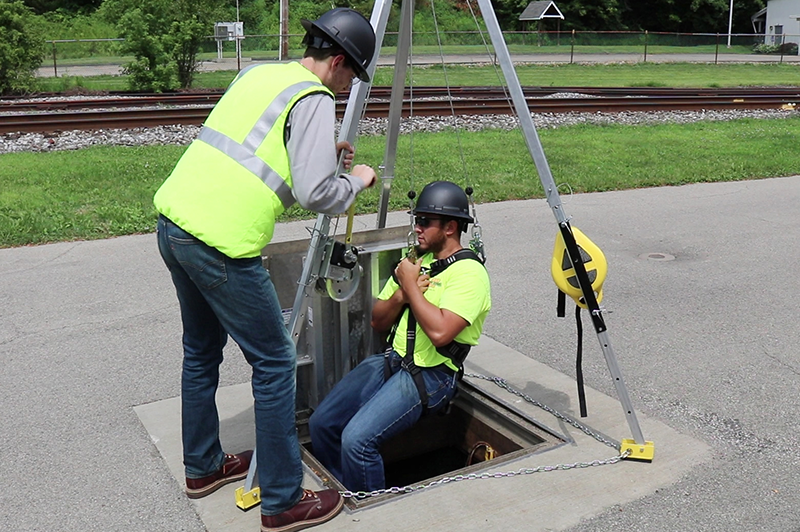
Workers across a wide range of industries may need to enter what’s known as a confined space, such as tunnels, manholes, crawl spaces, and other confined environments. Due to the potential hazards of these spaces, OSHA has issued strict requirements for confined space entry. Take a look at OSHA’s requirements for confined spaces as well as the safety equipment used to rescue workers from potential hazards.
What Is a Confined Space?
According to OSHA, a confined space must meet the following criteria:
- Is large enough for an employee to bodily enter and work;
- Has limited or restricted means of entry and exit; and
- Is not designed for continuous occupancy.
Yet, OSHA distinguishes between “confined spaces” and “permit-required confined spaces” or PRCS. Permit-required confined spaces meet the requirements listed above and have one or more of the following characteristics:
- Contains or has a potential to contain a hazardous atmosphere; or
- Contains a material that has the potential for engulfing an entrant; or
- Has an internal configuration that could trap or asphyxiate an entrant by inwardly converging walls or a floor which slopes downward and tapers to a small cross section; or
- Contains any other recognized serious safety or health hazard.
OSHA only requires an initial evaluation of the space and does not require employers to document the evaluations. However, employers will need to reevaluate the space if "there are changes in the use or configuration of a non-permit confined space that might increase the hazards to entrants.” If necessary, the employer will reclassify the space as a permit-required confined space.
Rescue Equipment Requirements for Confined Spaces
Considering that hazards and configurations tend to vary from one confined space to another, OSHA does not enforce strict requirements for confined space entry/exit safety equipment, including tripods and winches. Yet, the organization does provide some guidance on the topic.
- The outside end of the retrieval line should be attached to a fixed point or a lifting device so that rescue can begin as soon as the rescuer becomes aware that they need to be rescued.
- A mechanical device is required for vertical permit spaces more than 5 feet deep.
- Power winches and overhead cranes can pose a threat to workers. Power winches should not be used if they could cause additional harm to employees.
- Powered retrieval winches are recommended if depths exceed 50 feet and should be equipped with torque limiters of approx. 450 lbs. to avoid damaging an incapacitated person.
For many employers, a safety tripod may be the best choice when working in confined spaces. The French Creek 9' Tripod 3-Way Rescue Unit and Winch S50G-M9 meets all applicable ANSI and OSHA standards. It can withstand 5000 lbs. of vertical load and comes with a material winch. It’s also lightweight and extremely portable, making it easy to deploy it in the field. It comes with a self-retracting lifeline, so if a worker falls, the unit will lock up automatically to stop the fall.
The French Creek 9' Tripod Rescue System S50_-9 is another version of the S50_-M9, minus the material winch. It comes with adjustable/locking aluminum legs, safety chain, non-slip rubber safety shoes, and two attachment points on the steelhead. At 83 lbs., it’s even lighter than the S50_-M9, making it a great choice for teams that do not require a material winch.
The French Creek 7' Tripod and 50' 3-Way Rescue Unit and Winch S50G-M7 also comply with all applicable ANSI and OSHA standards. It’s manufactured with a durable, light cast aluminum housing, and includes a mounting bracket for the tripod or French Creek's Davit Systems, a #45 split pulley, and carabiner for attaching the lifeline to the tripod. It’s one of the lightest safety tripods on the market, weighing just over 60 lbs.
For more help on finding the right confined space entry and safety tripods, contact the professionals at PK Safety.
